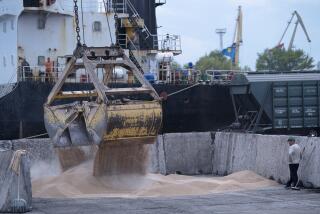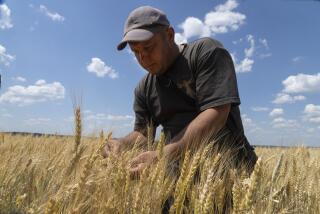Albania Seeks to Ease Food Shortage : Europe: The continent’s poorest country, where the ‘engine stopped working,’ looks to other nations for a jump-start to help it weather the winter.
- Share via
TIRANA, Albania — Sacks of flour were piled against the front wall of an otherwise bare village shop, but villagers said they had no firewood for baking or even to heat their homes.
At a state store in Tirana, women crowded the counter as a harried saleswoman checked their names in a large register and weighed out weekly meat rations.
That day, frozen chicken from Hungary was filling the meat allotment, which ranges from 4 1/2 to 6 1/2 pounds a month per family. The flour in the village was a gift from Turkey.
In Europe’s poorest country, life focuses on the search for food. Flour, meat and other staples, rationed for years, have become either extremely scarce or unavailable.
Officials hope for enough aid to get through the winter. One drawback is that food shipments increase the temptation not to work in an economy devastated by isolation and mismanagement under Enver Hoxha, the Stalinist dictator who died in 1985 after 41 years in power.
Tens of thousands of Albanians have fled to the West. Efforts to redistribute land collectivized by the Communists are in chaos. In a paternalistic society that has followed orders for centuries, no one is giving them.
“We are an engine that has stopped working,” said Zhydi Pepa, a deputy premier in the coalition government formed in June by the former Communist Party and opposition groups. “We need help to start it again.”
State stores have no sugar, rice or cheese. Some mountain regions lack even bread.
When 20,000 Albanians commandeered ships to take them across the Adriatic to Italy, the Italians responded by pledging 186,000 tons of food aid to keep them at home.
The Group of 24 most industrialized nations recently pledged $150 million worth of grain and other products. Relief trucks arrive daily.
Albanian leaders are depending on ample food to avert unrest this winter and allow them to pursue market-oriented reforms.
“We want to give incentives to produce,” said another deputy premier, Gramoz Pashko. “Next year, we can be in far better shape.”
Lukan Jani of the Home Trade Ministry, which is responsible for food supplies, said he fears even a greater flight if Western countries do not provide enough aid.
Supplies are most precarious in the mountainous northeast, which is cut off in winter.
Residents of Bacaj, a mountain village just north of Tirana, said there had been no bread for a month. The Turkish flour stacked in the store at Bacaj had arrived two days earlier.
A woman with a baby on her arm, who would not give her name, wanted to know why rations were distributed by family instead of per capita. “Some of us have two family members and some of us 15,” she said.
Villagers said even the water system has broken down.
Arif Karica, the district governor, said basic foods were not to be had in the surrounding Mat district.
The democratic upheaval that forced the Communists to hold multiparty elections, and the sudden exposure of the country’s backwardness, have nearly brought Albania to a halt.
Production has been drastically reduced by a lack of raw materials and a general strike that paralyzed the economy in May.
Pepa said the economy is operating at no more than 50%. He said food aid is necessary, but that technical assistance and advice are of greater long-term importance for his nation’s 3 million people.
“Albanians want to work,” Pepa said. “They have for 50 years. If you send tractors, you will see how productive Albanians can be.”
Pashko, an economist who helped found the first and strongest non-communist group, the Democratic Party, is trying to liberalize trade and get state enterprises sold to private investors.
Political instability, talk of early elections and impatience with continuing hardship threaten reform.
“No one is working because there is so much talk about privatization and social assistance,” said Petrit Sala, who oversees food distribution in the Mat district.
Italian aid had not yet arrived there. Some villagers expressed suspicion that the Italian food was being sold under the counter in Tirana, but officials insist that will not happen.
District commissions for food distribution are responsible directly to a state commission. The amount of aid at each storage facility is to be registered.
Good intentions, however, can be overwhelmed by ignorance, a breakdown in law and order and the primitive infrastructure of a nation that legalized private automobiles only this summer.
Sala joined Pepa in appealing for practical help.
When James A. Baker III visited in June, Sala noted, the U.S. secretary of state “gave us a great lesson because he said he’ll teach us how to catch fish instead of giving them to us.”
“I graduated from university in economics,” he said, “but I know nothing of market economics.”
More to Read
Sign up for Essential California
The most important California stories and recommendations in your inbox every morning.
You may occasionally receive promotional content from the Los Angeles Times.













